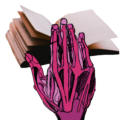The After Archive
After the end, or after the beginning, or after we started to write these essays everything changed. I wait for my ability to imagine a relationship with the past or with the future to return. I cannot speak for the others.
When this appears it will again be after. In other words, the anachronism of our gesture seems appropriate. Within the context of a publication dedicated to the study of American literature after 1945, we find it necessary to speak of epic poetry — Gilgamesh, Beowulf — of the nineteenth-century American West, and of the closed stacks of a German museum. But we write in the inexplicable present:
not knowing——fissuring——my body——a tableau of distress——to keep people alive——to hold——discordant——family history——kin ghosts——accomplices——evidence——responsibility——not knowing——the body of the archive——civil war——a time we still inhabit——unmoored——fantasy——this encounter——tomorrow——yesterday——
We have built an archive. Our words are acts of preservation, markers of loss, and together an opening toward something larger, something after ——
The After Archive is co-sponsored by the Beinecke Rare Book & Manuscript Library at Yale University.

